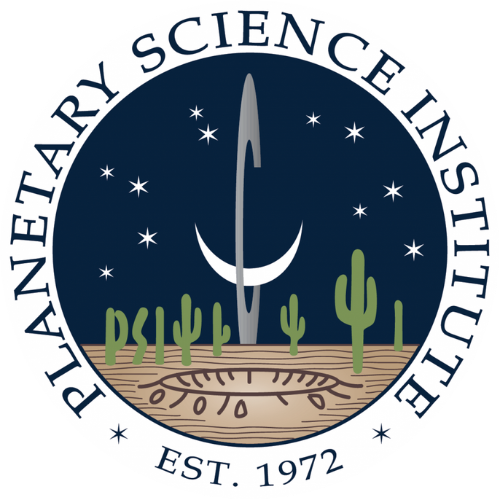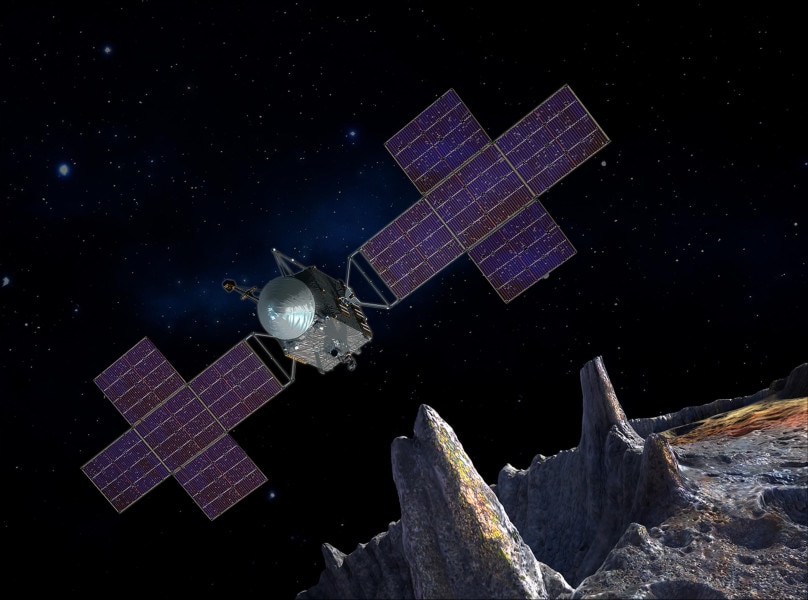October 13, 2023, Tucson, Ariz. – NASA’s Psyche spacecraft is on its way to exploring – for
the first time – a world made not of rock or ice, but of metal.
The Psyche mission will explore the origin of planetary cores by studying the metallic
asteroid 16 Psyche, one of the most intriguing targets in the main asteroid belt, which
orbits the Sun between Mars and Jupiter, located about three times farther away from the
Sun than is the Earth. The asteroid measures about 130 miles in diameter and is thought to
be comprised mostly of metallic iron and nickel, similar to Earth’s core. This asteroid may
be the survivor of a violent hit-and-run with another object that stripped off the outer,
rocky layers of a protoplanet.
Planetary Science Institute Senior Scientist Thomas Prettyman is a Psyche Co-Investigator
and is also the lead for one of the mission’s science working groups – the Light Elements
Working Group.
“Psyche may be the stripped core of a small planetesimal,” Prettyman said. “If so, the
Psyche mission has the potential to shed new light on the inner workings of planetary
cores.”
NASA hopes the mission to Psyche will offer answers on how Earth and other rocky planets
formed. This will be the first mission to an asteroid with substantial amounts of metal, as
previous missions have explored asteroids made mostly of rock or ice. The asteroid Psyche
may be part of the interior of a planetesimal, a building block of a rocky planet. By studying
it, scientists seek to determine whether the asteroid was a planetary core.
It will take until August 2029 for the spacecraft to travel 3.6 billion kilometers (2.2 billion
miles) to reach Psyche, aided by a slingshot gravity assist from going around Mars. The
spacecraft will orbit the asteroid from a distance of about 700 kilometers, getting
progressively closer over about two years.
Prettyman’s work on Psyche is funded by a subcontract from Arizona State University.
MEDIA CONTACT:
Alan Fischer
Public Information Officer
520-382-0411
[email protected]
SCIENCE CONTACT:
Thomas Prettyman
Senior Scientist
[email protected]
PSI INFORMATION
Mark V. Sykes
Director
520-622-6300
[email protected]
PSI HOMEPAGE
PSI PRESS RELEASES
http://www.psi.edu/news/press-releases
THE PLANETARY SCIENCE INSTITUTE:
The Planetary Science Institute is a private, nonprofit 501(c)(3) corporation dedicated to
Solar System exploration. It is headquartered in Tucson, Arizona, where it was founded in
1972.
PSI scientists are involved in numerous NASA and international missions, the study of Mars
and other planets, the Moon, asteroids, comets, interplanetary dust, impact physics, the
origin of the Solar System, extra-solar planet formation, dynamics, the rise of life, and other
areas of research. They conduct fieldwork on all continents around the world. They also are
actively involved in science education and public outreach through school programs,
children’s books, popular science books and art.
PSI scientists are based in 30 states and the District of Columbia.

